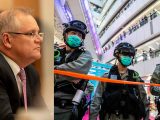Everything You Need to Know About Singapore’s General Elections
July 9, 2020More than 2.6 million registered voters are set to hit the polls in Singapore’s 18th general election on Friday to vote in a government that will lead the country through the duration of the global coronavirus pandemic.
A total of 192 candidates from 11 political parties are competing for 93 seats in parliament, with the long-ruling People’s Action Party (PAP), led by Prime Minister Lee Hsien Loong, all but certain to retain their majority, as they have for decades.
Indeed, Singapore’s elections are less a question of who will win, and more a question of how much the PAP will win by. The party’s share of the votes has never fallen below 60 percent, and its share of seats in parliament is even higher.
This year’s election was called early, on June 23, much to the dissatisfaction of opponents and observers who argued that it was skewed in favour of the ruling party, which already enjoys mammoth advantages and resources.
The group ASEAN Parliamentarians for Human Rights said in a June report that without structural changes to its electoral system, Singapore’s poll would be “neither free nor fair.”
“There’s a reason that the ruling PAP has won every election since Singapore’s self-governance—the entire process is heavily stacked in its favour,” APHR Executive Director Teddy Baguilat Jr., a former Philippine congressman, said in a statement.
“The very purpose of an election is for people to express their political will freely,” Baguilat added. “Opposition candidates face insurmountable challenges not only to run in elections but also for their message to reach eligible voters, due to a short campaigning period and strict media restrictions. In addition, authorities continue to use draconian laws to target political opponents and muzzle other critical voices in a limited civic space.”
Still, this year’s crisis vote is a historic first for Singapore, and the lopsided playing field has not deterred opposition parties from hitting the ground running in an effort to bring their messages to the masses—most of whom cautiously opted to stay home during the nine-day campaigning period.
So what makes this election different?
Singapore’s current Dorscon (Disease Outbreak Response System Condition) status stands at orange, the second highest level, and social distancing measures have been ramped up to prevent a second wave of coronavirus infections.
As Prime Minister Lee himself noted, “We are still in the midst of COVID-19 so it will not be a normal election campaign.”
Politicians were banned from shaking hands with voters on the campaign trail, while some were barred from walking the campaign trail at all. Face masks had to be worn at all times and loud cheering was discouraged. Mass gatherings weren’t allowed, so the nighttime political rallies—long known for drawing thunderous crowds of tens of thousands to sports stadiums and open fields—had to go.
In their place were subdued house calls, which quickly became the meat of campaigning. Candidates in teams of four to five met up at popular spots across the island before splitting up to visit voters in their homes. It proved to be grueling but crucial work, with political hopefuls racing against time, running up and down flights of stairs in towering public housing blocks to cover as much ground and deliver as many calling cards to voters as possible.
Without the staple political rallies, these personal engagements became the only “real way” for many Singaporeans to engage with the election.
They were, however, also able to engage virtually. Televised debates between ruling party and opposition candidates were allowed for the first time in Singapore election history. Many kept up with the proceedings on social media, with colorful exchanges dominating on Facebook and Twitter.
Candidates also took to Instagram in droves, signing up for public accounts in an effort to engage with the coveted target audience of young swing voters. They devised savvy digital videos and promotional campaigns to connect with potential voters in a more personal way.
But one of the most noticeable differences was the absence of familiar political faces. Several veteran politicians from the ruling party made their exit from this year’s race, giving way to new faces.
Who are the contenders?
The PAP, which has ruled Singapore since 1959, dominates every poll without fail, with the Workers’ Party (WP) historically its strongest opposition, despite never coming within striking distance of victory.
The newly-formed Progress Singapore Party (PSP), meanwhile, has attracted intense public and media attention thanks to the support of the prime minister’s estranged younger brother, businessman Lee Hsien Yang.
“The PAP has lost its way,” Lee Hsien Yang told VICE News. “Singaporeans can still win back their country by voting for transparency, accountability and a diversity of voices in the opposition, who will be brave and prepared to speak up in parliament.”
There are eight other opposition parties, including the Singapore Democratic Party, the National Solidarity Party, Reform Party, Singapore People’s Party, Singapore Democratic Alliance, People’s Power Party, Peoples Voice, and Red Dot United.
Where will the big battles be?
The most hotly contested districts have been the PAP stronghold of Tanjong Pagar (which includes Chinatown, the popular Tiong Bahru neighborhood, and the Orchard Road shopping belt) and the opposition-held district of Aljunied, represented by the Workers’ Party.
But all eyes this year will turn to the east of Singapore, where Deputy Prime Minister and Finance Minister Heng Swee Keat will take on Workers’ Party darling Nicole Seah. The stakes are high for Heng, who risks losing his shot at the prime ministership if he fails to beat back Seah, a familiar face on the ground who commands a devoted following among residents.
Other areas to watch include the West Coast and the sleepy town of Sengkang in the northeast, which has recently become a competitive district due to the influx of young, independent Singaporean families to the area.
How big is social media’s role in the polls?
With the absence of physical rallies, the internet indisputably played a huge role in this year’s race.
Social media was used more intensively this time around, with parties channeling their energies into efforts to create engaging digital content to promote their candidates. The tactic made stars out of fresh faces like Jamus Lim and Raeesah Khan from the Workers’ Party, with thousands rallying behind them (figuratively, of course) and pledging their support.
Social media proved slightly dicier ground for the PAP. A prominent pro-PAP supporter page, for instance, was removed from Facebook for “violating site policies.” The page, which amassed more than 250,000 likes since its start in 2011, was known for publishing pro-government posts slamming the opposition, and previously received a police warning for breaching cooling-off rules during a 2017 by-election. Facebook, however, maintained that its removal was “based on the behavior of these accounts, not based on the content they posted.”
Meanwhile, a “trial by internet” destroyed the political dreams of PAP hopeful Ivan Lim, who was taken to task by former subordinates in the military and civil service who publicly accused him of being “arrogant,” “condescending,” and “elitist.” The backlash was swift and fierce—within a day, Lim conceded defeat and exited the race.
While opposition parties benefited from the internet’s comparatively even playing field, the new virtual landscape also proved problematic. On July 4 multiple government notices were issued to four online platforms—state broadcaster Channel NewsAsia’s website, The Online Citizen, New Naratif, and the National University of Singapore Society—over comments made by opposition politician Paul Tambyah about the outbreak of COVID-19 in migrant worker dormitories. The notices were seen by activists as a clampdown on political speech.
Online, more mudslinging ensued and personal attacks were amplified. First-time WP candidate Raeesah Khan, for instance, found herself at the center of a police investigation over alleged past comments she made on race and religion. She has since issued a public apology and is not out of the race.
PAP politicians were not spared either. Murali Pillai hit out against an unspecified “scurrilous attack” against his son on social media. Addressing local media, Pillai said: “My son was the victim of a scandal. He also committed offenses. The court has dealt with all these matters.” He insinuated the attack was aimed at damaging his candidacy, adding: “The timing of the post leaves nothing to the imagination.”
Who is popular with the young and why?
Some Gen Z Singaporean voters will be going to the polls for the first time this year. To capitalize on the youth vote, opposition parties fielded a diverse range of young candidates.
With the help of social media, favorites soon emerged. The WP’s Jamus Lim, who has won praise for his eloquence and calm demeanor, won netizens’ hearts after he made his debut appearance in a televised debate that was also streamed on Facebook. Lim, a young father of an 8-month-old daughter, made his political debut in Sengkang—a strategic move, considering the high density of young couples and families living in the area.
Young voters also flocked to Lim’s running mate, 26-year-old Raeesah Khan, whose championing of diversity, equality, and mental health causes drew a wave of online support among a new, more politically-aware generation.
Singaporean photographer Edwin Koo, who has trailed the party on this year’s campaign, says that opposition candidates appealed to young and politically conscious voters especially in the new slates of East Coast and Sengkang. “In the past, people were afraid to be associated with opposition politicians, it was taboo. Now it’s become cool, having a badge of honour and street cred that places you on a different level amongst friends,” he told VICE News. “It shows that you think and care about who gets to lead the country in parliament and also on the ground.”
Who will win?
The People’s Action Party has won every general election in Singapore since 1959 and it is highly unlikely to lose its majority in parliament this year. But a strong showing from other parties could rattle the PAP’s confidence. The leading opposition Workers’ Party may also make gains, and observers are waiting to see if that could translate to more seats in parliament.
This pandemic election may also see the introduction of another opposition party into parliament, the Progress Singapore Party led by former PAP stalwart Dr. Tan Cheng Bock.


